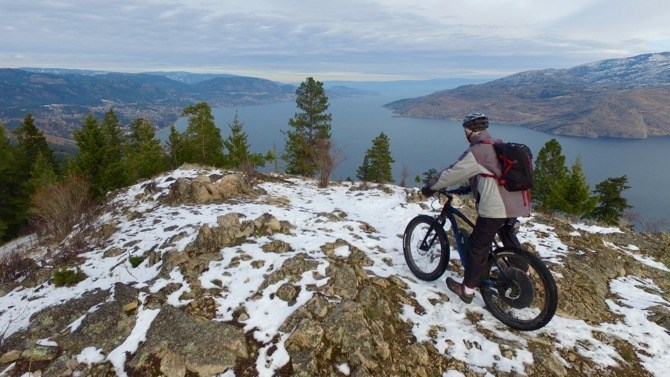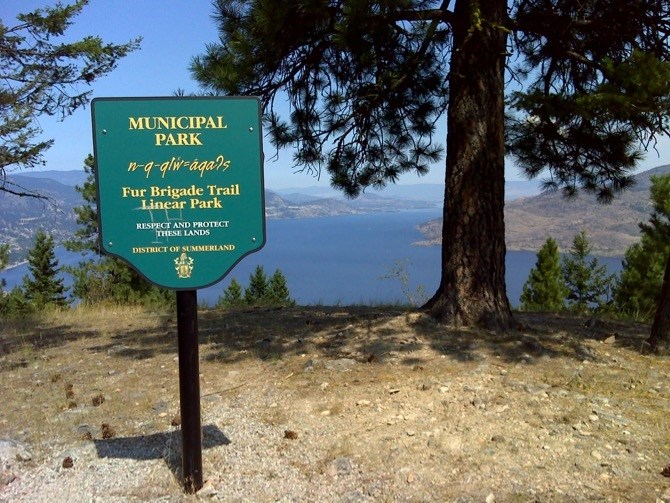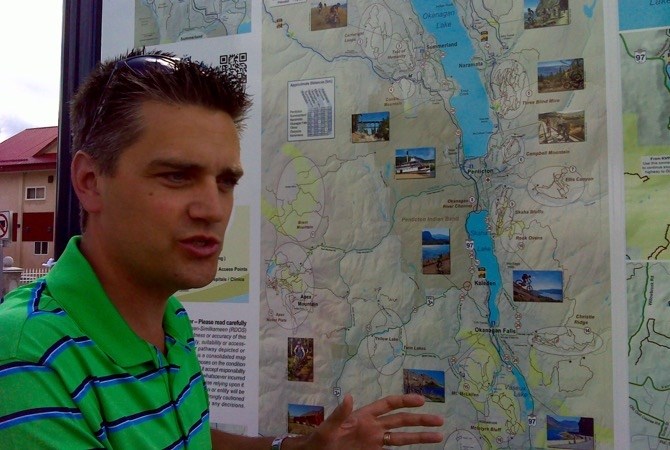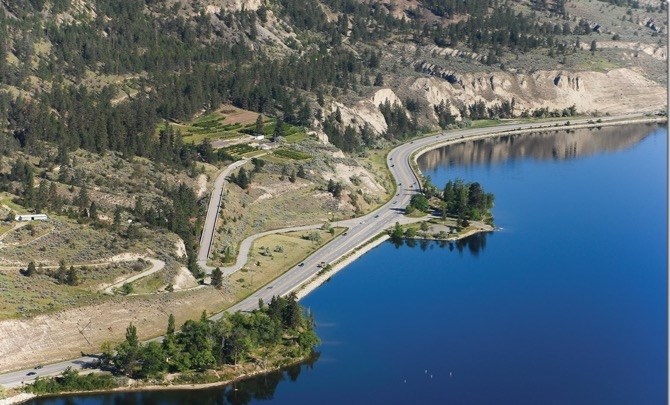
Image Credit: Contributed
May 15, 2016 - 11:30 AM
TRAIL ADVOCATES DREAM OF A 250 KM TRAIL FREE OF VEHICLES
OKANAGAN - When the door closed on rail freight business in the Okanagan Valley, another one quickly opened.
No one wants to see a business go under but the bankruptcy of the short line Kelowna Pacific Railway and the closing of Canadian Pacific’s Okanagan subdivision has rather suddenly created the tantalizing possibility of a continuous bike-and-hike trail stretching from Osoyoos to Sicamous.
Taken together, they measure just under 100 kilometres and form a huge chunk of the 250 km between the Trans-Canada Highway in the north and the U.S. border in the south.
Trail advocates throughout the Okanagan have not missed this and in the last couple of years, as the possibility became apparent, have begun to sell the idea of a trans-valley trail and pressure local governments to help make it happen.
Henry Sielmman and Phil McIntyre-Paul are part of that quiet groundswell of enthusiasm for non-motorized, multi-use trail initiatives. McIntyre-Paul is the executive director of the Shuswap Trail Alliance, an advocacy group that manages an existing trail network. Sielmann chairs the Trail of the Okanagans, a non-profit society which, as the name implies, supports the creation of a linear valley trail.
With the multi-jurisdictional nature of trails, both men are careful not to step on other toes and equally anxious not to be seen as speaking for the entire Okanagan.
Yet it's also true that neither one of them can contain their enthusiasm when they get started talking about trails and their potential in the Okanagan to tap into the global cycling tourism trend.

Abandoned CP Rail corridor passes right through Enderby.
Image Credit: Contributed
“You have this beautiful valley with all the lakes and mountains and the wineries and orchards,” Sielmann says.
His group is pushing hard for a Summerland-to-Peachland trail connection using portions of the 19th-century Fur Brigade Trail, itself part of a much older trail used by native people for millenia, which Sielmann says adds local history and indigenous culture into the mix.
“That’s when international tourists get excited and that’s our big message that these trails will attract people from overseas. We think lots of people.”
McIntyre-Paul also bubbles over when talking trails and not just for their beauty.
“The appeal of rail lines is the low one or two per cent grade. The groundwork has already been done. They are already graded and packed which is why it is so compelling for cyclo-tourism."
And should there be a tourism windfall, it won’t just accrue to the larger centres, McIntyre-Paul adds, but to places like Grindrod and Okanagan Falls.
“It’s the small communities that really benefit. You can travel 100 km a day on a bike if you want but what we are seeing is about a two- or three-hour window of cycling each day,” he says. "As soon as you start linking these places, you’re talking multiple days."
It’s hard not to get caught up in their vision of a gently rolling trail, connecting the best of the Okanagan, giving it much more to offer as an international tourist destination.
For make no mistake, it’s tourism and the potential economic spinoffs driving these trail initiatives and should it succeed in bridging its plentiful gaps, Sielmann says it would vault the Trail of the Okanagans to international star status.

Valley view from the Brigade Trail Lookout.
Image Credit: Contributed
NOT-SO-HAPPY TRAILS
The idea of a linear valley trail has been around for years but its topography has always stood in the way. Simply following the existing linear trail — Highway 97 — creates the lowest valued type of trail.
Kelowna attempted to establish a rails-with-trails path alongside the CN Rail corridor within city boundaries.
It ended in 2009 after CN got cold feet. Concerned about the liability of running locomotives and boxcars alongside baby carriages and bicycles, the company stopped negotiating rail trail leases altogether.
But the original idea was to use the Kettle Valley Railway trail along the east side of Okanagan Lake from just outside Kelowna to Penticton.
With its 1,300 km of rail bed throughout the Okanagan and Kootenays, linking to the KVR is an attractive proposition to any trail aficionado.
Sielmann says the problem is altitude gain, the enemy of multi-use trails everywhere and the main reason usage will drop off with every per cent a trail grade rises.
Access to the KVR line at Myra Canyon is only 20 km away from the rail head in Kelowna but it rises 900 metres, often at grades that could challenge a Tour de France bike rider.
“It wouldn’t be a lot of fun,” Sielmann says.
The idea of bridging the gap along the west side of Okanagan Lake is relatively new although with no rail line to follow, also has vertical and horizontal challenges.

B.C. Transportation minister Todd Stone at the introduction of the B.C. Cycling Route Initiative.
Image Credit: Contributed
DREAMING BIG
Optimism is the hallmark of all trail boosters. They believe all obstacles can be overcome.
And trail boosters like Sielmann and McIntyre-Paul are going to need it for even with the addition of 100 km of abandoned railway line, a potential valley trail has more holes in it than a spaghetti strainer.
In the south, the Regional District of the Okanagan Similkameen has taken the lead on trail development (it even employs a dedicated trails manager).
The list of trail gaps includes a federal nature reserve, a missing bridge and a way across the Penticton Indian Band reserve.
Sielmann says the regional district has a trails master plan and seems determined to work through all of them, taking the long view of trail development.
“They are tackling them one at a time but they don’t have a huge trail budget so it won’t happen right away,” he says.
In the Central Okanagan, the new rail trail owners might have 48 km of gently graded rail bed but they also must deal with numerous level crossings and has still not been able to conclude negotiations with Colin Day, a former Kelowna councillor who lives in Lake Country.
Day was one of two property owners along the corridor who exercised his right of first refusal with CN, in his case to purchase the section of the corridor running through his lake front property on the east short of Wood Lake.
The topography of the rural area means there is no easy way around the property, although Day himself has suggested the trail could be routed the other way around Wood Lake using the recently decommissioned chunk of Highway 97 now known as the Pelmewash Parkway.
Day did not respond to a request for an interview.

A view of the trail route between Penticton and Summerland.
Image Credit: Mike Biden
In the north, McIntyre-Paul and the Shuswap Trail Alliance face probably the biggest gap, as completing the purchase of the line isn’t certain.
Alliance members can only watch as the Splatsin First Nation leads negotiations with CP Rail to purchase the portions of the corridor it doesn’t already own.
CP Rail decommissioned the Okanagan subdivision in 2009 and followed the federal guidelines for abandoned rail lines, offering portions of it first to the federal and provincial governments, then to the municipalities it passes through.
Both the District of Sicamous and the town of Enderby through the North Okanagan Regional District entered into negotiations with CP but could not conclude a deal. The company then turned the land over to its real estate division and that’s when the Splatsin First Nation got into the game, successfully purchasing two sections of the line at the Sicamous Narrows and outside Armstrong.
“They ended up acquiring the bookends of the corridor, so to speak, and then turned around said to everyone else, this is too important, we can’t lose this,” McIntyre-Paul says, giving full credit to band for realizing the corridor's potential.
After missing out the first time, the regional districts of the North Okanagan and Columbia Shuswap are back at the table with Splatsin First Nation, negotiating with CP Rail's real estate division, but McIntyre-Paul admits they have not seen nor heard a price, the railway company has no obligation to sell and hasn't confirmed its plans for the remainder of the corridor.
Still, it’s not lost on alliance members that the provincial government jumped in with cash to help with the purchase of the Okanagan Rail Trail corridor and McIntyre-Paul says the hope is it will help make their own trail a reality.
His hope extends down south where Sielmann, despite the many obstacles, says he can see himself riding his mountain bike on some kind of trans-Okanagan trail in his lifetime.
"It will take years to get there but I’m quite confident I will get to ride it myself before I get too old, maybe five to 10 years,” Sielmann states.
PART ONE: A sneak peak at a possible future for the Okanagan Rail Trail
To contact a reporter for this story, email John McDonald or call 250-808-0143 or email the editor. You can also submit photos, videos or news tips to the newsroom and be entered to win a monthly prize draw.
We welcome your comments and opinions on our stories but play nice. We won't censor or delete comments unless they contain off-topic statements or links, unnecessary vulgarity, false facts, spam or obviously fake profiles. If you have any concerns about what you see in comments, email the editor in the link above.
News from © iNFOnews, 2016